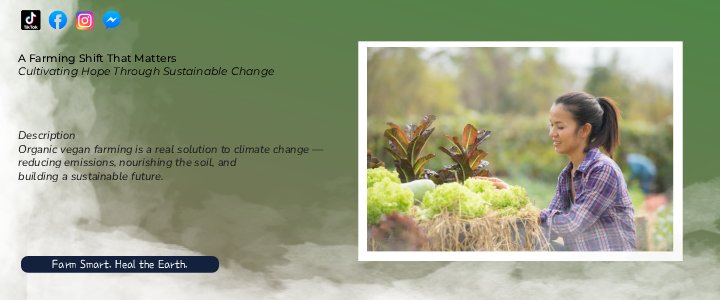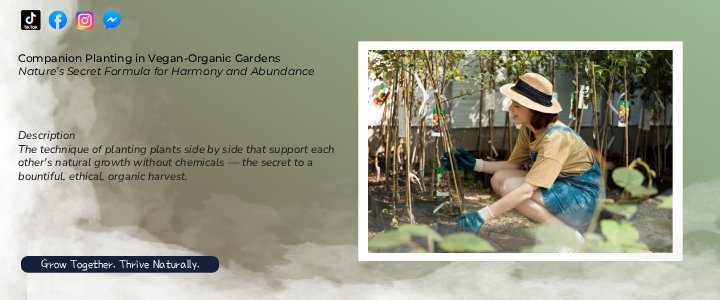Key Differences and Benefits
Organic food has long been viewed as a healthier and more sustainable alternative to conventional farming. But within the organic movement, a new discussion is taking place: Vegan-Organic vs. Conventional Organic. While both share the goal of reducing chemicals and protecting the environment, they take different approaches when it comes to methods, ethics, and sustainability.
For readers in the United States and Europe, where ethical consumerism and climate concerns are growing, this comparison provides a clearer understanding of what sets Vegan-Organic apart and why it matters for the future of farming.
What Conventional Organic Farming Means
Conventional organic farming is built on the principle of avoiding synthetic chemicals, pesticides, and fertilizers. Instead, it uses natural alternatives such as compost, manure, bone meal, and biological pest control. This system prioritizes soil health, biodiversity, and reduced chemical pollution.
However, because livestock and animal byproducts play a central role, many organic farms still depend on practices that involve animal exploitation. For vegans and eco-conscious consumers, this raises ethical and environmental questions.
What Makes Vegan-Organic Different
Vegan-Organic farming shares many of the same goals as conventional organic, but it goes further by excluding all animal inputs. This means no manure, blood meal, bone meal, or fish emulsion. Instead, fertility and soil health are built entirely through plant-based methods, such as composting, green manures, mulching, and crop rotation.
This approach is designed to align with vegan values while also reducing the environmental footprint associated with industrial livestock. It represents a holistic method that addresses both ecological sustainability and animal ethics.
Key Differences Between Vegan-Organic and Conventional Organic
To better understand the comparison, here are some of the most important differences:
1. Fertilizers and Inputs
- Conventional Organic: Uses manure, fish-based fertilizers, and bone meal.
- Vegan-Organic: Relies on plant compost, green manure, and mineral-based amendments.
2. Ethical Approach
- Conventional Organic: Reduces chemicals but allows animal exploitation in farming cycles.
- Vegan-Organic: Excludes animal use entirely, promoting compassion in agriculture.
3. Environmental Impact
- Conventional Organic: Lower chemical use but still tied to livestock-related emissions.
- Vegan-Organic: Reduces methane emissions and promotes climate-friendly farming.
4. Consumer Appeal
- Conventional Organic: Appeals to health-conscious shoppers.
- Vegan-Organic: Appeals to both health-conscious and ethically-driven consumers.
These differences show that while both systems move away from industrial farming, Vegan-Organic provides an additional ethical and ecological layer.
Benefits of Vegan-Organic Farming
The advantages of Vegan-Organic extend beyond ethics. For farmers and consumers in the U.S. and Europe, the benefits include:
- Reduced greenhouse gas emissions from livestock farming.
- Safer food production without animal-based fertilizers that may carry pathogens.
- More sustainable soil-building practices using plant matter and biodiversity.
- Alignment with vegan and environmental values, offering greater transparency for conscious consumers.
Together, these benefits highlight why Vegan-Organic farming is gaining recognition as a next step in sustainable agriculture.
Challenges and Considerations
Of course, Vegan-Organic farming is not without challenges. Awareness among consumers is still limited, and official certification systems are not yet as widespread as conventional organic labels. Farmers may also need additional training in plant-based soil fertility techniques.
Despite these obstacles, momentum is growing as more people demand ethical, sustainable, and climate-conscious food choices.
If you’re new to the concept, check out our beginner’s guide on What Is Vegan Organic Agriculture to understand the basics before comparing it with conventional organic methods.
The debate between Vegan-Organic vs. Conventional Organic reflects the evolution of sustainable farming. Both offer alternatives to industrial agriculture, but Vegan-Organic takes an extra step by combining ecological care with ethical responsibility.
For consumers in America and Europe, choosing Vegan-Organic means supporting farming that respects animals, reduces emissions, and nurtures the soil with plant-based solutions. As the movement grows, it has the potential to redefine what “organic” really means in the 21st century.



